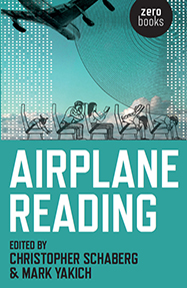As they do to many slightly cautious or even wholly reasonable people, commercial jets seemed unlikely to me—the weight, the velocity, the shape and construction of the craft, the theory of gravity. Maybe in my mid-twenties I craved drama, because I thought: when flying, one should be prepared to die. The obvious correlatives registered fully in my rational mind: when crossing the street one should be prepared to…. When slicing a day-old bagel…. When walking through cheat grass among boulders in the warmth of a late Nevada morning one should be prepared to die. Still, when I first began flying on my own, I did my best to achieve some kind of closure with my life before I entered the terminal. To this end, I always carried my favorite book—Stations, by Jay Meek—in case there might be a moment of foreknowledge in advance of the fiery plunge from the sky, in which I might focus on calming words, like:
We change positions, relative to change
like the white ferry as it approaches.
Or:
I want life to go on beyond my own
and it’s such a simple wish
I’m astonished just having to say it.
Or even just:
Walking in New York, I have seen taxis
queued up along the park
beside the tigers in its children’s zoo,
and beyond the zoo the corporate towers
Because why? I thought the consolation of a simply perceived moment of human experience would be sufficient? Doubtless, I would’ve screamed as loudly and wet myself as thoroughly as any of the loveable mortals firing through their last neurological sequences.
I had, though, had one prior experience of transcendent calm: waiting tables on a Sunday breakfast at a Perkins across from a hospital in a small Midwestern city. Sunday mornings are busy, but this day was beyond busy. My section was overrun with grieving families on break from hospital vigils, good church-going folks, ambitiously civic, college kids with visiting parents—fellow citizens of every stripe keen for a crowd experience organized around a mass-produced breakfast. I was slammed and way behind, the lobby was full out the door, and I verged on panic: that near eruption of input, processing, item-memory, spatial memory, rapid button-pushing, grabbing and setting down of things, while continuing to appropriately smile and pleasantly if rapidly interact. When it gets like that, I can be a pleader: inside I’m going “please,” “please,” as if a little man lived inside me, who would open up new levels of physical capability to me, or magically transport me to some tranquil Zen garden somewhere. In the heat of it, I had to fill water glasses for my new eight-top and during the moments it took to hold the glasses against the pressure-spigot, I allowed myself to stare at the colorful tea boxes on the station shelves. My mind, stunned, quieted, and I just fell in to the moment. Time telescoped and I had a short respite. To this day, I remember the bright yellow square next to the bright orange square (“Lemon Zinger” next to “Wild Sweet Orange”) as if they’d branded my retinas. And I remember the mental shift that took place. With full awareness, I stepped out of experience. It felt as if about fifteen minutes elapsed while I filled the eight glasses, and during those fifteen minutes I had full freedom. I walked out to my car, drove to the edge of town, took a nice long look at the beet fields, just harvested, steaming in the chill morning air, and then drove back to Perkins, finished filling the last glass, and re-entered my breakfast service, refreshed.
So I do believe in the spirit. Something we might drift into beyond familiar confines. Now that flying has become routine, to me, I have to remind myself. I do believe. I do.
William Stobb is the author of five poetry collections, including the recent Absentia and the National Poetry Series selection, Nervous Systems, both from Penguin Books.






